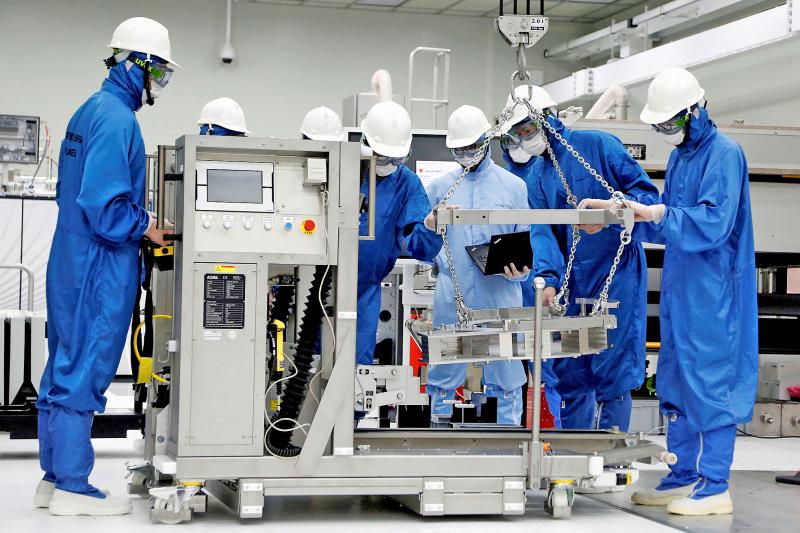Intel Corp yesterday said it has placed its first order with ASML Holding NV to purchase the semiconductor industry’s first TWINSCAN EXE: 5200 system, as the US chip giant aims to compete with Taiwan Semiconductor Manufacturing Co (TSMC, 台積電) in advancing to 2-nanometer process technology.
The Dutch semiconductor equipment maker’s TWINSCAN EXE:5200 system is an extreme ultraviolet (EUV) high-volume production system with a high numerical aperture (NA) that can produce 220 wafers per hour, more than the 150 wafers that its previous generation TWINSCAN EXE:5000 system can handle.
ASML aims to launch the new system in 2024.

Photo: Reuters
ASML president and chief technology officer Martin van den Brink said in a statement that the new system “delivers continued lithographic improvements at reduced complexity, cost, cycle time and energy that the chip industry needs to drive affordable scaling well into the next decade.”
Announcing the deal in a statement, Intel executive vice president and general manager of technology development Ann Kelleher said: “Working closely with ASML, we will harness high-NA EUV’s high-resolution patterning as one of the ways we continue Moore’s Law and maintain our strong history of progression down to the smallest of geometries.”
Intel was the first to purchase the TWINSCAN EXE:5000 system in 2018.
The company said that the new purchase reflects its continued collaboration with ASML and marks the beginning of its production with the new technology in 2025.
TSMC is also likely to buy the TWINSCAN EXE:5200 system and is expected to be the first in the industry to introduce 2-nanometer production, a supply chain source told the Taipei Times yesterday.
“Placing the first order does not mean Intel will be the first to massively produce chips with the tool,” the source said, adding that Intel still has a long way to go before catching up with TSMC in commercializing 2-nanometer technology.
TSMC’s 2-nanometer chips would enter the market in 2025, the firm said, adding that the chips would be the highest-performing chips available.
Separately, ASML yesterday said that it did not expect a factory fire in Germany to disrupt output.
The fire at its Berlin facility early this month was extinguished within two hours, and the company still expects to ship about 55 EUV systems this year, it said.
“We were able to put the fire out in a couple of hours, but still there was significant damage,” ASML chief executive officer Peter Wennink said in a statement. “Because of the hard work and the creativity, we currently believe that we can manage the situation and that we will not see a significant impact on our EUV output in the year 2022.”
Wennink said demand is 40 to 50 percent above the ASML’s maximum capacity, and it would take “two to three years to get a nice balance between supply and demand.”
The firm’s shipments would increase next year, he added.
Additional reporting by Bloomberg

Micron Memory Taiwan Co (台灣美光), a subsidiary of US memorychip maker Micron Technology Inc, has been granted a NT$4.7 billion (US$149.5 million) subsidy under the Ministry of Economic Affairs A+ Corporate Innovation and R&D Enhancement program, the ministry said yesterday. The US memorychip maker’s program aims to back the development of high-performance and high-bandwidth memory chips with a total budget of NT$11.75 billion, the ministry said. Aside from the government funding, Micron is to inject the remaining investment of NT$7.06 billion as the company applied to participate the government’s Global Innovation Partnership Program to deepen technology cooperation, a ministry official told the

Taiwan Semiconductor Manufacturing Co (TSMC, 台積電), the world’s leading advanced chipmaker, officially began volume production of its 2-nanometer chips in the fourth quarter of this year, according to a recent update on the company’s Web site. The low-key announcement confirms that TSMC, the go-to chipmaker for artificial intelligence (AI) hardware providers Nvidia Corp and iPhone maker Apple Inc, met its original roadmap for the next-generation technology. Production is currently centered at Fab 22 in Kaohsiung, utilizing the company’s first-generation nanosheet transistor technology. The new architecture achieves “full-node strides in performance and power consumption,” TSMC said. The company described the 2nm process as

POTENTIAL demand: Tesla’s chance of reclaiming its leadership in EVs seems uncertain, but breakthrough in full self-driving could help boost sales, an analyst said Chinese auto giant BYD Co (比亞迪) is poised to surpass Tesla Inc as the world’s biggest electric vehicle (EV) company in annual sales. The two groups are expected to soon publish their final figures for this year, and based on sales data so far this year, there is almost no chance the US company led by CEO Elon Musk would retain its leadership position. As of the end of last month, BYD, which also produces hybrid vehicles, had sold 2.07 million EVs. Tesla, for its part, had sold 1.22 million by the end of September. Tesla’s September figures included a one-time boost in

Shares in Taiwan closed at a new high yesterday, the first trading day of the new year, as contract chipmaker Taiwan Semiconductor Manufacturing Co (TSMC, 台積電) continued to break records amid an artificial intelligence (AI) boom, dealers said. The TAIEX closed up 386.21 points, or 1.33 percent, at 29,349.81, with turnover totaling NT$648.844 billion (US$20.65 billion). “Judging from a stronger Taiwan dollar against the US dollar, I think foreign institutional investors returned from the holidays and brought funds into the local market,” Concord Securities Co (康和證券) analyst Kerry Huang (黃志祺) said. “Foreign investors just rebuilt their positions with TSMC as their top target,